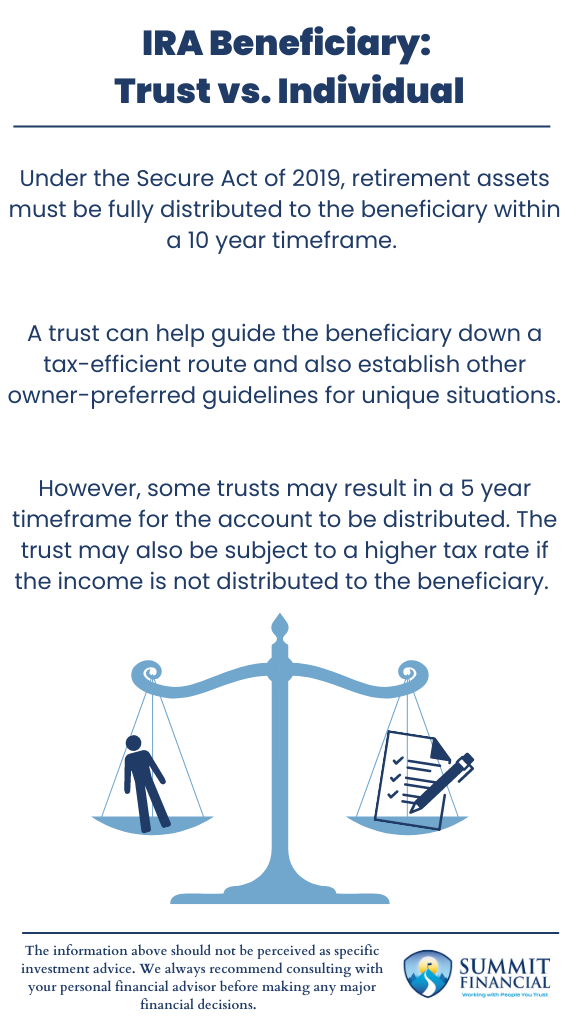We believe it is a huge decision to choose who to list as the beneficiary on your qualified retirement account. While the decision is ultimately the owner’s, we do have a few pieces of information to share that may influence that decision. This blog post is geared towards revealing some uncommon techniques and how they may influence the inheritance your beneficiaries receive.

The SECURE Act and Its Impact on Inherited Retirement Accounts
First, it is essential to highlight one of the most significant changes introduced by the Secure Act in 2019. After the rule changes, qualified accounts must be fully distributed to a non-spouse beneficiary within a 10-year timeframe.
This means your beneficiary only has ten years to withdraw the funds from the account. We typically recommend that beneficiaries consider spreading out these withdrawals over the entire 10-year period, as the withdrawals will be treated as taxable income.
Taking all the money within one year may place the beneficiary in a higher tax bracket, resulting in higher tax payments. Spreading the withdrawals over 10 years can spread out the tax liability and potentially keep more money in the beneficiary’s pocket.
Direct Beneficiary Designations: Pros and Cons
If the beneficiary is responsible and understands these tax repercussions, there is no harm in listing them directly as the account beneficiary. However, if the owner feels the need to structure the withdrawals to help prevent a large tax liability or wants to limit direct access to the funds, a trust could be listed as the account beneficiary.
This means that the trust would become the account owner upon the account holder’s death, and the assets would then be distributed according to the trust guidelines. This can be particularly useful when the beneficiary is an irresponsible adult, a minor child, an individual with special needs, or when the original owner wishes to list the successor beneficiary on the newly inherited account.
There are many reasons why an individual may prefer to assign the account to a trust rather than to an individual directly. These are a few examples, but there are certainly more, and we believe the more complex a situation is, the more likely a trust may be the more beneficial route.
Potential Drawbacks of Naming a Trust as Beneficiary
However, there are some downsides to listing the trust as the beneficiary. There are various types of trusts available, so it is important to ensure that you have the correct estate planning tools in place. Some trusts require that the inherited assets be distributed over a 5-year timeframe instead of the standard 10 years.
Also, some trusts are able to retain income and RMD’s within the trust, but then this could also trigger a higher level of taxation since trusts are taxed at the top tax rate. The taxation and distribution rules of the trust depend on if it is a See Through trust or if the trust is setup for a Conduit or Accumulation purposes.
This is why it is essential to consult with your estate planning attorney to determine the type of trust that is most suitable for your specific situation. Sometimes, it may be appropriate to have more than one trust depending on the complexity of the estate.
How to Choose a Beneficiary for Your Retirement Account – Highlights
- Under the Secure Act of 2019, retirement assets must be fully distributed to the beneficiary within a 10-year timeframe.
- Qualified withdrawals are treated as taxable income, so strategic withdrawals may allow the beneficiary to reduce the amount of taxes paid.
- A trust can help guide the beneficiary down this tax-efficient route, but they include a few potential drawbacks to be aware of.
Speak With a Trusted Advisor
If you have any questions about your investment portfolio, retirement planning, tax strategies, our 401(k) recommendation service, or any other general inquiries, please contact our office at (586) 226-2100. Please feel free to forward this commentary to a friend, family member, or co-worker.
If you have experienced any changes to your income, job, family, health insurance, risk tolerance, or overall financial situation, please call us so we can discuss them.
We hope you learned something today. If you have any feedback or suggestions, we would appreciate hearing from you.
Best Regards,
Zachary A. Bachner, CFP®
with contributions from Robert Wink, Kenneth Wink, and James Wink.
If you found this article helpful, consider reading:
- How Do Bull Markets and Bear Markets Differ
- Navigating College Funding
- Financial Planning Mistakes to Avoid
- Tax Filing Explained
Sources:
- https://www.investopedia.com/retirement/designating-trust-as-retirement-beneficiary/
- https://www.fidelity.com/viewpoints/wealth-management/insights/iras-left-to-a-trust
- https://www.fiduciary-trust.com/insights/naming-trust-ira-beneficiary/#:~:text=The%20most%20common%20designations%20are,option%20than%20naming%20an%20individual


